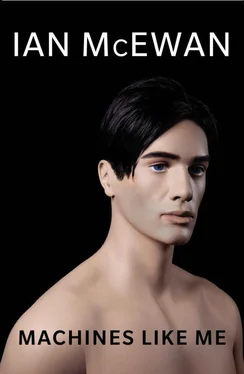I called out to him, ‘I’m roasting a chicken with butter and tarragon.’ It was mischievous of me, knowing his plain diet of electrons.
Without pausing, and in the flattest of tones, he said, ‘They go well together. But it’s easy to burn the leaves when you’re browning the bird.’
Browning the bird? It was correct, I guessed, but it sounded odd.
‘What d’you advise?’
‘Cover the chicken with tinfoil. From the size of it I’d say seventy minutes at 180. Then brush the leaves off into the juice while you brown at the same temperature for fifteen minutes without the foil. Then pour the tarragon back on with the juices and melted butter.’
‘Thanks.’
‘Remember to let it stand under a cloth for ten minutes before you carve.’
‘I know about that.’
‘Sorry.’
Did I sound tetchy? By the early eighties we were long used to talking to machines, in our cars and homes, to call centres and health clinics. But Adam had weighed up my chicken from across the room and apologised for the extraneous advice. I glanced back at him again. Now I noticed that he’d pulled up the sleeves of the sweater to his elbows to expose powerful wrists. He’d interlaced his fingers and was resting his chin on his hands. And this was him without a personality. From where I stood, with the light picking out his high cheekbones, he looked tough, the quiet guy at the bar you’d prefer not to disturb. Not the sort to hand out cooking tips.
I felt the need, rather childish, to demonstrate that I was in charge. I said, ‘Adam, will you walk round the table a couple of times. I want to see how you move.’
‘Sure.’
There was nothing mechanical about his gait. In the confines of the room he managed a loping stride. When he’d been round twice he stood by his chair, waiting.
‘Now you could open the wine.’
‘Certainly.’
He came towards me with his open palm extended and I placed the corkscrew on it. It was of the articulated, cantilevering kind favoured by sommeliers. It gave him no trouble. He raised the cork to his nose, then reached into a cupboard for a glass, poured a half-inch and passed it to me. As I tasted it, his gaze on me was intent. The wine was hardly of the first or even second rank, but it wasn’t corked. I nodded and he filled the glass and set it down carefully by the stove. Then he returned to his chair as I turned away to prepare a salad.
A peaceful half-hour went by and neither of us spoke. I made a dressing for the salad and chopped the potatoes. Miranda was in my thoughts. I was convinced I’d reached one of those momentous points in life where the path into the future forked. Down one route, life would continue as before, down the other, it would be transformed. Love, adventures, sheer excitement, but also order in my new maturity, no more wild schemes, a home together, children. Or these last two were wild schemes. Hers was the sweetest nature, she was kind, beautiful, amusing, vastly intelligent…
At a sound behind me, I came back to myself, heard it again, and turned. Adam was still in his chair at the kitchen table. He had made, then repeated, the sound of a man purposefully clearing his throat.
‘Charlie, I understand that you’re cooking for your friend upstairs. Miranda.’
I said nothing.
‘According to my researches these past few seconds, and to my analysis, you should be careful of trusting her completely.’
‘What?’
‘According to my—’
‘Explain yourself.’
I was staring angrily into Adam’s blank face. He said in a quiet sorrowful voice, ‘There’s a possibility she’s a liar. A systematic, malicious liar.’
‘Meaning?’
‘It would take a moment, but she’s coming down the stairs.’
His hearing was better than mine. Within seconds there was a gentle tap at the door.
‘Would you like me to get it?’
I didn’t answer him. I was in such a fury. I went into the miniature hallway in the wrong frame of mind. Who or what was this idiot machine? Why should I tolerate it?
I wrenched the door open, and there she was in a pretty pale blue dress, smiling merrily at me, a posy of snowdrops in her hand, and she’d never looked so lovely.
Several weeks passed before Miranda was able to work on her share of Adam’s character. Her father was ill and she made frequent journeys to Salisbury to look after him. She had a paper to write on nineteenth-century Corn Law reform and its impact on a single street in a town in Herefordshire. The academic movement known generally as ‘theory’ had taken social history ‘by storm’ – her phrase. Since she had studied at a traditional university which offered old-fashioned narrative accounts of the past, she was having to take on a new vocabulary, a new way of thinking. Sometimes, as we lay side by side in bed (the evening of the tarragon chicken had been a success) I listened to her complaints and tried to look and sound sympathetic. It was no longer proper to assume that anything at all had ever happened in the past. There were only historical documents to consider, and changing scholarly approaches to them, and our own shifting relationship to those approaches, all of which were determined by ideological context, by relations to power and wealth, to race, class, gender and sexual orientation.
None of this seemed so unreasonable to me, or all that interesting. I didn’t say so. I wanted to encourage Miranda in everything she did or thought. Love is generous. Besides, it suited me to think that whatever had once happened was no more than its evidence. In the new dispensation, the past weighed less. I was in the process of remaking myself and eager to forget my own recent history. My foolish choices were behind me. I saw a future with Miranda. I was approaching the shores of early middle age, and I was taking stock. I lived daily with the accumulated historical evidence my past had bequeathed, evidence I intended to obliterate: my loneliness, relative poverty, poor living quarters and diminished prospects. Where I stood in relation to the means of production and the rest was a blank to me. Nowhere, I preferred to think.
Was my purchase of Adam more proof of failure? I wasn’t sure. Waking in the small hours – next to Miranda, her place or mine – I summoned in the darkness a lever of the sort found by old railway tracks that would shunt Adam back to the store and return the money to my account. By daylight the matter was more diffuse or nuanced. I hadn’t told Miranda that Adam had spoken against her, and I hadn’t told Adam that Miranda was to have a hand in his personality – a punishment of sorts. I despised his warning about her, but his mind fascinated me – if a mind was what he had. His appearance was thuggishly handsome, he could put on his own socks and he was a technical miracle. He was expensive but this child of the Wiring Club could not let him go.
Working on the old computer in my bedroom, out of Adam’s sight, I typed in my own choices. I decided that answering every other question would be a sufficiently random kind of merging – our home-made genetic shuffling. Now I had a method and a partner, I relaxed into the process, which began to take on a vaguely erotic quality; we were making a child! Because Miranda was involved, I was protected from self-replication. The genetic metaphor was helpful. Scanning the lists of idiotic statements, I more or less chose approximations of myself. Whether Miranda did the same, or something different, we would end up with a third person, a new personality.
I wasn’t going to sell Adam, but the ‘malicious liar’ remark rankled. In studying the manual, I’d read about the kill switch. Somewhere on the nape of his neck, just below the hairline, was a mole. If I were to lay a finger on it for three seconds or so, then increase the pressure, he would be powered down. Nothing, no files, memories or skills, would be lost. That first afternoon with Adam I’d been reluctant to touch his neck or any part of him, and held back until late in the day after my successful dinner with Miranda. I’d spent the afternoon at my screen losing £111. I went into the kitchen where the dishes, pots and pans were piled in the sink. As a test of his competence I could have asked Adam to clear up, but I was in a strange, elevated state that day. Everything to do with Miranda glowed, even her nightmare that had woken me in the small hours. The plate I had put before her, the lucky fork that had been in and out of her mouth, the pale bowed shape where her lips had kissed her wine glass were mine alone to handle and cleanse. And so I began.
Читать дальше










![Иэн Макьюэн - Таракан [litres]](/books/435106/ien-makyuen-tarakan-litres-thumb.webp)

